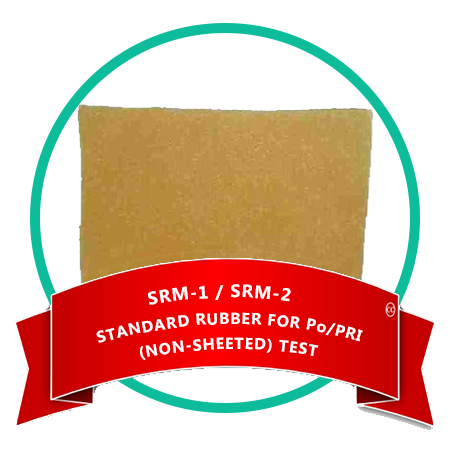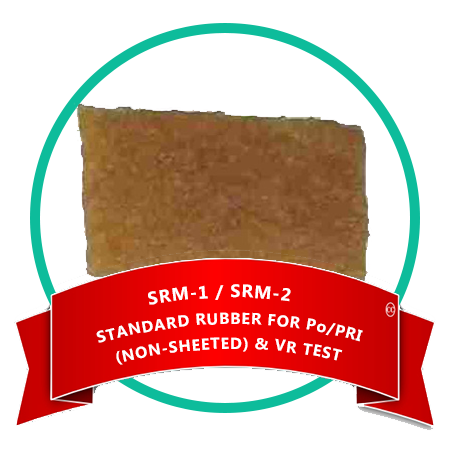FIELDS OF TESTING : Chemical & Mechanical
We carry out test on dry, raw natural rubber according to test methods developed by the Malaysian Rubber Board (MRB, formerly known as RRIM) and documented in SMR Bulletin No. 7 (Revised Edition 2018). These methods are also adopted by most of the rubber producing countries nowadays.
Accredited Tests
| Materials / Product Tested |
Type of Test / Properties Measured | Standard Test Methods |
|---|---|---|
| Dry, Raw Natural Rubber (Chemical Test) |
Dirt
Volatile Matter (VM) Ash Nitrogen (N2) Acetone Extract (AE) |
SMR Bulletin No.7,B2,2018
SMR Bulletin No.7,B3,2018 SMR Bulletin No.7,B4,2018 SMR Bulletin No.7,B5,2018 SMR Bulletin No.7,D1,2018 |
| Dry, Raw Natural Rubber (Mechanical Test) |
Rapid Plasticity (P0) and Plasticity Retention Index (PRI)
Mooney Viscosity (VR) Colour (Lovibond) Wallace Accelerated Storage Hardening (WASHT) Mooney Accererated Storage Hardening (MASHT) Rheometric Cure(Oscillating Disc) |
SMR Bulletin No.7,B6,2018
SMR Bulletin No.7,B7,2018 SMR Bulletin No.7,B8,2018 SMR Bulletin No.7,C1,2018 SMR Bulletin No.7,C2,2018 SMR Bulletin No.7,C3,2018 |
Non-Accredited Tests
| Materials / Product Tested |
Type of Test / Properties Measured | Standard Test Methods |
|---|---|---|
| Dry, Raw Natural Rubber (Chemical Tests) |
Detection of oxidised/vulcanised material (Toluene Test) Fatty Acid, Total and Components |
In-house, ITM-03, 2011
In-house, ITM-04, 2013 |
| Dry, Raw Natural Rubber (Mechanical Tests) |
Density and Specific Gravity | In-house, ITM-02, 2010 |
STATISTICAL QUALITY ASSURANCE PROGRAMME:
Rubbers ( Chemical & Mechanical Properties Testing)
ABOUT THE PROGRAMME
MCL proficiency Test Programme on Rubbers provides laboratories with a statistical quality assurance (SQA) tool, enabling them to compare, improve, and maintain performance in conducting chemical and mechanical tests on rubber material. Labs are instructed to conduct the test in their facilities using the MRB (RRIM) test methods ( SMR Bulletin No. 7, Revised Edition 2018) cited in the programme, and to record their test results on the data report form.
WHY SHOULD YOUR LABORATORY PARTICIPATE?
These programme provide participating laboratories with an SQA tool enabling them to assess their performance in how they conduct a given test or series of tests by comparing their data against the data of other participating laboratories. You receive test results available only to participating laboratories that will help you:
- Monitor strengths and weaknesses of your laboratory’s performance
- Periodically compare your test results and calculated statistical parameters with other laboratories
- Compare test data for a given quality parameter against laboratories using different rubber test methods
TEST MATERIALS
The two different rubber materials include : cup lump and latex materials. Other rubber materials may be included if sufficient number of test specimens to conduct tests according to MRB methods. Each lab receives two different rubber materials in each test cycle. Allowance for extra test specimens will be provided. Sample, test instructions, and data report sheets are distributed during the last week preceding the testing month. Test results are due to MCL by the end of the test week with final summary reports mailed to participants approximately one month following receipt deadline of test data.
STATISTICAL ANALYSIS OF DATA
Each lab returns completed test data report forms to MCL for use in generating statistical summary reports. MCL handles all data on a strictly confidential basis with no disclosure of lab identity except for one’s own lab. Published reports contain all lab test data (coded) , statistical analysis of test data, charts plotting test results versus lab code and other pertinent information. Published summary reports are generated from MCL QA Unit.
METHODS INCLUDED IN THE PROGRAMME
Each lab returns completed test data report forms to MCL for use in generating statistical summary reports. MCL handles all data on a strictly confidential basis with no disclosure of lab identity except for one’s own lab. Published reports contain all lab test data (coded) , statistical analysis of test data, charts plotting test results versus lab code and other pertinent information. Published summary reports are generated from MCL QA Unit.
| PROGRAMME | DETAILS |
|---|---|
| DIRT | B2 Test method for the determination of Dirt Content in rubber. |
| VOLATILE MATTER (VM) | B3 Test method for the determination of moisture and solvent content in rubber. |
| RAPID PLASTICITY (P0) AND PLASTICITY RETENTION INDEX (PRI) | B6 Test method for plasticity properties of rubber materials. |
| MOONEY VISCOSITY (VR) | B7 Test method for molecular weight and crosslinking properties of rubber materials. |
PROGRAMME SCHEDULE AND FEE INFORMATION
This programme is conducted twice a year, with testing in Apr and September. Labs may register at any time. For more information, please contact us at Phone : +603 3344 8028 Fax : +603 3344 7168 Email : mclabsb@gmail.com
PROGRAMME REQUIREMENTS
Participation is on an annual fee basic and open to all laboratories. Registration fees must be paid in advance to participate in the programme. Testing must be performed within the participants’ laboratory facilities using the specified MRB methods.
STANDARD REFERENCE RUBBER MATERIALS
Standard reference rubber materials (SRM) are certified and issued by MCL to verify or calibrate measurement systems.
SRM is used by laboratories to :
- Strengthen their testing quality and reliability
- Simplify the internal quality control
- Provide long-term internal comparability
- Ensure comparability nationally and internationally
- Provide traceability
- Validate and evaluate test methods
- Calculate the measurement uncertainty
SRM is available for Po/PRI and VR tests at different ranges :
| SRM Code | Material | Estimated P0 Range |
Estimated P30 Range |
Estimated VR Range |
|---|---|---|---|---|
| SRM – 1 | CV 70 | 27 – 32 | 21 – 25 | 48 – 62 |
| SRM – 2 | CV 70 | 33 – 38 | 26 – 32 | 63 – 75 |
| SRM – 4 | SBR | – | – | 45 – 60 |
| Type | Detail |
|---|---|
| Delivery: | 5 to 8 work days after confirmation of order / receipt of payment. |
| Packing: | The standard rubber is wrapped with plastic sheet and sealed in a polythene bag. |
| Shelf Life: | 5 months from the date of issue. |
| Minimum Order: | 10 pcs. of Po/PRI sheeted piece or 20 pcs. of VR test piece. |
| Remarks: | * The weight of a P0/PRI or VR test piece is 20 – 25 g. As a general guideline, 1 kg of standard rubber is equal to approximately 45 test pieces. ** PRI test piece (approx. 50g) is sheeted to the thickness of between 3.2 – 3.6 mm, cut into size approximately 10cm X 15cm, and sealed in a polythene bag. Prices quoted do not include delivery cost. Overseas order will be delivered by courier service to be borne by the purchaser. |
| Note: | Please specify the SRM Code and number of pcs. required for each test in your order. All standard rubber sold is come with a Certificate of Analysis. |
Specification

Material : CV 70
Size of Sheeted Piece : approx. 12 cm x 17 cm
Thickness : 3.2 – 3.6 mm; Net Weight : (50 ± 3) g

Material : CV 70
Size of Cut Piece : approx. 4.5 cm x 8 cm
Thickness : approx. 1 cm; Net Weight : (25 ± 3) g

Material : Styrene-Butadiene Rubber (synthetic rubber) 1502 or SBR 1502
Size of Cut Piece : approx. 4.5 cm x 8 cm
Thickness : approx. 1 cm; Net Weight : (25 ± 3) g